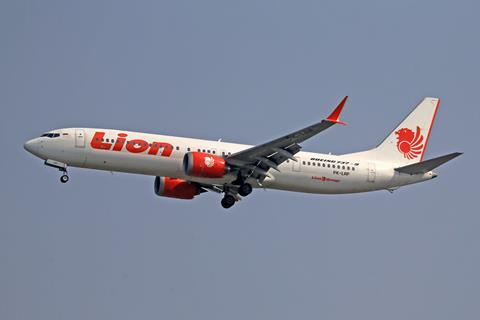Indonesian low-cost operator Lion Air has withdrawn from service its Boeing 737 Max 9s from service.
The move comes as the country’s transport ministry calls for a temporary grounding following an accident involving an Alaska Airlines Max 9.

The event on 5 January saw a plugged mid-cabin door detach from the aircraft as it climbed out of Portland, Oregon. US regulators have already initiated a grounding of the type pending inspections.
However, both Lion and the ministry note that the three Max 9s (registered PK-LRF, PK-LRG, PK-LRI) do not have plugged emergency exit doors like the Alaska aircraft, as they are operated in a high-density configuration.
Nonetheless, the transport ministry says it will ground the Max 9 “until further notice”, as it works with Lion, Boeing and its US counterparts.
In a separate statement, Lion says it has “taken preventive steps” in the wake of the Alaska incident, and has carried out inspections on the mid-cabin emergency exit door.
Lion says it is carrying out a “lock operational test” on the doors, as part of “efforts to meet strict aviation safety standards”.
According to flight tracking data, the three Max 9s are deployed on domestic flights. Two of them (PK-LRF and PK-LRG) had initially operated with sister unit Thai Lion Air between 2017 and 2019, but were transferred back to Lion in 2023.
Lion is the sole operator of the Max 9 in Asia-Pacific, where the smaller Max 8 more widely operated. One of Lion’s 737 Max 8 was involved in one of two fatal crashes that led to a global grounding of the 737 Max series in 2019.
At least one other regulator in the region has stepped up inspections of the 737 Max family. India’s Directorate-General of Civil Aviation has asked its carriers to carry out a one-time inspection of their 737 Max fleets. No Indian carrier operates the Max 9, but airlines like Akasa Air and SpiceJet are major Max 8 operators.
SpiceJet, in a statement on 8 January, says there were “no adverse findings” identified during the checks.
Meanwhile, China’s civil aviation regulators were reported to be mulling a response to the incident. China, a key market for Boeing, was the first country to ground the 737 Max in 2019, and was the last to lift the operational ban.
Other operators of the Max 8, such as Singapore Airlines, Fiji Airways and Bonza, indicate that fallout from the Alaska incident has had little to no impact on existing operations, stressing that they are not Max 9 operators.


























